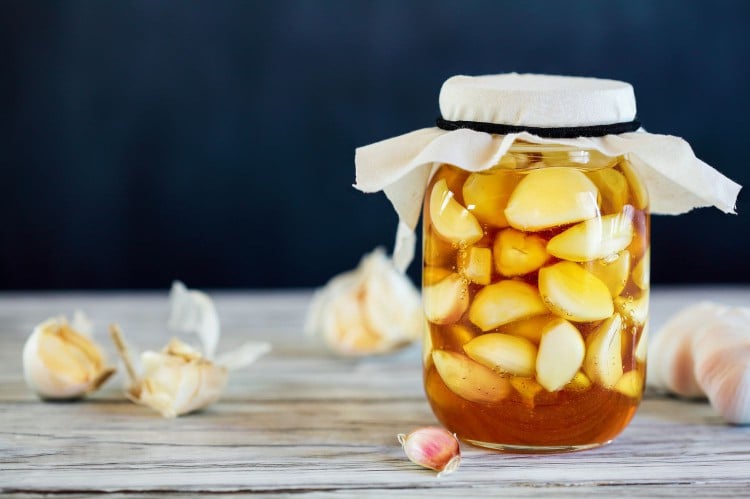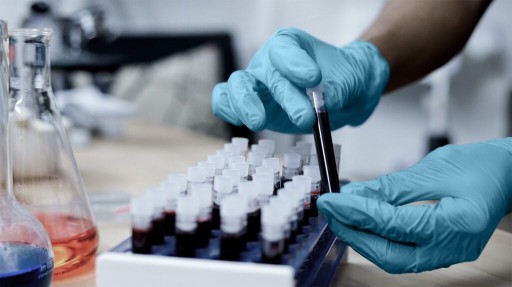- People on social media are fermenting garlic in honey as a cold and flu treatment, but there isn’t research to back up this method.
- Garlic and honey, individually, do contain a variety of health benefits.
- Experts recommend anyone trying the treatment use it as a complementary approach to cold and flu season, not a primary form of care.
Fermenting garlic in honey may be a social media cold and flu treatment, but does it actually work?
Wellness enthusiasts claim that garlic soaking in honey can prevent—or even treat—cold and flu. While there’s research that each of these individual ingredients boasts health benefits, research on what happens when you mix the two for the sake of cold and flu prevention doesn’t exist.
“This trend has increased in the media recently, and there is a lot of hype and many unsubstantiated health claims being made about this natural remedy,” Sharon Palmer, a registered dietitian nutritionist from California, told Health.
The concoction is an old household remedy that has been around for a long time, explained Rachel Dyckman, a registered dietitian nutritionist from New York City.
It’s also worth noting that most of the studies looking at the biological activity and bioactive compounds in garlic and honey have been done in vitro (in a lab dish), Heather Davis, a registered and licensed dietitian nutritionist at Nutrisense, told Health.
“In vitro studies have significant limitations in terms of what can or can’t be applied to how the compounds in question behave in vivo, or in a living body,” she said.
Here are the health benefits of garlic and honey, as well as what you need to know about mixing them during cold and flu season.

Getty Images / StephanieFrey
Both Honey and Garlic May Have Cold and Flu Benefits
Both garlic and honey have their own, individual health benefits.
According to Palmer, honey has been used as medicine for centuries.
“Honey contains phytochemicals with anti-inflammatory, antimicrobial, and antioxidant properties,” she said.
A 2021 review of multiple studies found honey was effective at easing cold symptoms, cough frequency, and cough severity. Another 2021 study found that honey can stimulate the immune system and have anti-inflammatory effects.
But pay attention to what kind of honey you use—one in vitro study specified manuka honey as stopping the flu virus from spreading.
“There does seem to be some potential benefit,” said Davis.
Research has also suggested that garlic boasts its own array of health benefits.
An older study suggests aged garlic extract pills can increase T cells in your blood—the type that ward off viruses. In a 2016 study, the extract reduced the severity of cold and flu.
It can be hard to harness the compounds in garlic because they change during processing, but that doesn’t mean the potential for wellness is absent.
A 2020 study confirmed garlic’s “potential” antiviral properties, while a 2021 report touted its antibacterial superpowers.
A 2014 analysis of multiple trials said there wasn’t enough evidence to show garlic could prevent or treat the common cold, though one study in that report said it could be preventative.
Research Doesn't Support Fermenting Garlic in Honey
As for the trending honey-garlic blend, there’s far less peer-reviewed published research on it, and none on the ferment as a whole.
“Definitive proof that a garlic and honey mixture can prevent or treat colds and flu remains elusive, with most support coming from personal testimonials rather than clinical research,” Melinda Ring, MD, executive director of the Osher Center for Integrative Health at Northwestern University, told Health.
“Specific studies on their combined fermented form are scarce,” she said.
A 2013 report on using garlic and Ethiopian tazma honey found they were better together than alone to tame Salmonella, E. coli, and other bacteria in vitro. A lab study from the same year tested garlic juice and Langese brand honey and showed that the combo killed strains of Streptococcus and Staphylococcus bacteria.
Palmer said there’s no scientific research she’s aware of that documents the health benefits of fermented garlic and honey.
And ultimately, there may be some risks with trying the concoction, said Davis.
“Botulism risk in raw honey and in garlic are both documented,” she explained. “Honey might contain various contaminants, including pesticides, antibiotics, heavy metals, and other toxic materials.”
Some demographics should be particularly cautious around this combination: babies under one year of age should not consume honey. And, it may not be safe for those who are immunocompromised or allergic to bee pollen, Dyckman explained.
Does Orange Juice Help With a Cold? What Experts Really Think of the Home Remedy
Trying Honey Garlic for Cold and Flu Season
Despite the potential dangers noted above, Dyckman said fermented garlic in honey is a relatively “benign intervention with few downsides.”
“[It] may be worth a try,” she said.
Given the lack of concrete evidence, Ring advises people to use the remedy as a complementary approach, rather than a primary treatment for cold or flu.
If you’re interested in trying it, she recommends doing it as part of a broader health effort and first talk to your doctor, especially if you have any underlying health conditions or are taking other medications including anticoagulants and anti-diabetes drugs.
Davis explained that the best bet for preventing or treating colds and flu is to eat adequate protein, vitamins, and minerals from whole foods. It's also helpful to steer clear of ultra-processed foods like added sugar.
Davis said that staying well-hydrated, getting enough sleep, and avoiding stress all “far more strong science behind them in terms of their ability to support immune health over time."








